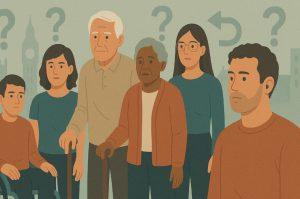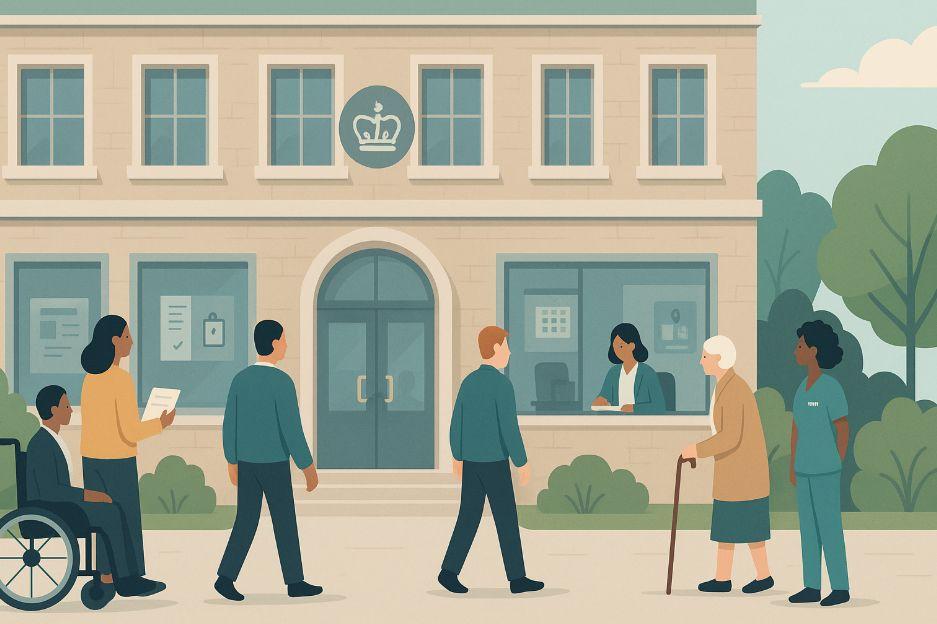Personal Independence Payment (PIP) is set for one of its most significant overhauls since it replaced Disability Living Allowance. With reform plans announced by the UK Government and consultations already underway, many are asking the same question: when will PIP changes come into effect in 2025?
This blog explores what’s changing, why these reforms are happening, and how they could impact claimants across London and the UK.
What Are the Key PIP Changes Planned for 2025?

The Department for Work and Pensions (DWP) has outlined major proposals that could reshape how Personal Independence Payment (PIP) is awarded and distributed across the UK.
At the heart of these proposals is a move from a uniform monthly cash benefit to a more tailored and potentially non-financial form of support. This would significantly shift the role that PIP plays in supporting individuals with long-term disabilities and health conditions.
Moving Away from Cash Payments
The government is exploring alternatives to monthly financial aid. This could include providing services or equipment directly to claimants instead of cash, such as mobility aids, therapy services, or even vouchers for care-related support. The aim is to make the benefit system more responsive to individual needs, though critics warn it may reduce financial autonomy.
Reassessment of Eligibility Criteria
Another core proposal involves how disability is assessed. Instead of relying on a points-based system based on routine tasks, the DWP is considering a “real-world impact” model. This could measure the extent to which a person’s disability affects their day-to-day functionality, placing less emphasis on specific medical diagnoses.
Mental Health Support Adjustments
Mental health is a particular focus. The current model allows those with psychological conditions to qualify for PIP, but under the new changes, those who are not actively receiving treatment or therapy may face new hurdles. The government argues this could encourage engagement with mental health services, while others worry it penalises people who struggle to access treatment.
Why Is the UK Government Reforming Personal Independence Payment?
The government’s motivation behind these proposed reforms lies in financial, administrative, and ethical concerns. With over three million people receiving PIP and annual costs exceeding £20 billion, ministers argue that the current system needs streamlining to maintain long-term sustainability.
Rising Costs and Sustainability Concerns
Between 2013 and 2023, the number of PIP claimants surged, leading to a sharp increase in expenditure. The government notes that a high proportion of recent claims relate to mental health, and without reforms, the costs are projected to double over the next five years.
Pressure from Public and Legal Scrutiny
Numerous legal challenges have exposed flaws in the current system, including allegations of unfair assessments and inconsistent decision-making. These criticisms have pushed the DWP to reconsider its approach and explore a model that places greater emphasis on fairness, transparency, and tailored support.
When Will the New PIP Eligibility Rules Be Implemented?
The government is proceeding cautiously with PIP reform, using a phased approach rather than an abrupt rollout. The public consultation launched in 2024 is set to conclude by July, after which the government will analyse the results and finalise the policy direction.
Expected Implementation Timeline
Reforms are not expected to come into effect until late 2025. The DWP has suggested that any nationwide changes will follow regional pilot schemes. This ensures the system is tested and refined before a full-scale launch across the UK.
| Stage of Reform | Anticipated Date |
| Consultation Close | July 2024 |
| Policy Finalisation | October 2024 |
| Pilot Scheme Launch | Q1 2025 |
| National Implementation Begins | Q3–Q4 2025 |
| Full UK Rollout (if approved) | Early 2026 (tentative) |
How Will These PIP Changes Affect Current Claimants?

While the reforms may be forward-looking, current claimants understandably want clarity on how they will be affected. According to the DWP, existing PIP recipients will continue receiving their payments until the new system is in place, and any changes will involve reassessments based on updated criteria.
Gradual Reassessments Over Automatic Transitions
The government has stated it will not abruptly stop payments for existing claimants. Instead, a reassessment process will be conducted to transition people from the current model to the new one. This reassessment is expected to include interviews, reviews of supporting evidence, and possibly medical evaluations.
Transitional Protections for Vulnerable Groups
To avoid causing distress or hardship, transitional payments or extended support may be introduced. These protections aim to provide continuity and safeguard the financial well-being of vulnerable individuals during the changeover.
What Is the Proposed Timeline for DWP’s PIP Reforms?
The DWP’s consultation outlines a multi-stage process for implementing PIP reforms:
- Policy development: Finalising feedback from the public consultation in 2024.
- Pilot testing: Running experimental schemes in targeted regions in early 2025.
- Evaluation and revision: Reviewing feedback and adjusting strategies by mid-2025.
- National rollout: Implementing reforms from Q3–Q4 2025.
This measured approach suggests that the government is keen to avoid the backlash seen during previous welfare reform attempts.
Could PIP Be Replaced with a New Disability Benefit in 2025?
One of the more dramatic possibilities under discussion is the complete replacement of PIP. While the government has not announced a specific new benefit, several alternative models have been floated in the consultation.
Potential Models Being Discussed
- A tiered support model based on severity
- A care voucher system for medical or therapeutic use
- Access to regional disability support services
Who Will Be Most Affected by the PIP Updates?

The impact of the proposed changes will not be felt equally. Some groups are likely to experience more significant consequences depending on the nature of their condition and the support they currently receive.
People with Mental Health Conditions
As the government tightens the criteria for mental health-related claims, individuals who are not in active treatment or who lack formal psychiatric diagnoses may struggle to qualify under the new model. This change could discourage people from applying or lead to reduced support for many current recipients.
First-Time Applicants and Young Adults
New applicants especially younger individuals unfamiliar with disability benefits may face additional hurdles in navigating a reformed system. Understanding the new eligibility requirements and support options could become more complicated if cash benefits are replaced by service-based models.
What Are Experts and Disability Advocates Saying About the PIP Reforms?
Many disability rights organisations have expressed serious concerns about the direction of the reforms. They argue that removing cash benefits could undermine the independence of those living with disabilities.
Criticisms From Advocacy Groups
- Loss of Autonomy: Moving away from cash payments might remove financial freedom for individuals with disabilities.
- Increased Bureaucracy: A more complex system could become harder to navigate, especially for those without access to professional support.
- Mental Health Undermined: Critics warn that some reforms risk minimising the daily impact of mental health challenges.
What Can Claimants Do to Prepare for the Upcoming PIP Changes?
While nothing is finalised yet, claimants can take steps to stay informed and protect their interests as the system evolves.
Steps to Take
- Ensure all medical documentation is up-to-date
- Speak with GPs and specialists about ongoing conditions
- Connect with disability support organisations
- Stay informed through the DWP website and newsletters
Keeping records of how conditions affect daily life can also help if reassessments occur under the new rules.
What Does the Future Hold for Disability Benefits in the UK?

The UK is on the cusp of a major transition in how it supports disabled individuals. Whether PIP is reformed or entirely replaced, the government has indicated a long-term vision of integrated support that is less about monthly payments and more about empowering individuals through services and intervention.
Towards a Holistic Support System
This holistic model seeks to create a safety net that includes not only financial aid but also access to health care, education, employment services, and community engagement. However, the transition must be managed with sensitivity, transparency, and strong protections for those who rely on current benefits.
Conclusion
So, when will PIP changes come into effect? Based on current government plans, the changes are expected to roll out in stages from late 2025, with preliminary pilot schemes launching earlier that year. Full national implementation is unlikely before 2026.
Until then, claimants should monitor updates from the DWP, maintain good documentation, and engage with the wider disability community to prepare for what’s ahead.
FAQS About PIP Changes in 2025
Will I lose my PIP in 2025?
No, existing claimants will not lose PIP overnight. The government plans to introduce a gradual reassessment and transition process.
What if I have a mental health condition but no ongoing treatment?
You may still qualify, but future assessments may require evidence of treatment or engagement with mental health services under the new rules.
Can I still apply for PIP before the changes happen?
Yes, you can apply under the current rules until the reforms are officially implemented.
What is the difference between cash payments and support services?
Cash payments give you financial autonomy, while support services may provide direct access to care, equipment, or therapy based on assessed needs.
How will the changes be communicated to me?
The DWP will send out written notices to affected individuals and publish updates on their official website.
Will the changes affect other disability benefits?
Not directly, but changes to how disability is assessed may influence eligibility for related benefits like Universal Credit or ESA.
What if I disagree with the new assessment?
You will have the right to appeal through the existing DWP tribunal process, and legal support will still be available.
READ MORE:
- DWP State Pension Back Payments in the UK: What to Expect in 2025
- DWP £299 Cost of Living Payment 2025: Eligibility and Payment Date
- How Much State Pension Will I Get If I Have Never Worked in the UK?
- Government Child Trust Fund £250 How Much Will I Get?
- Winter Fuel Payment 2025: Who Qualifies and How Much You’ll Get









Leave feedback about this